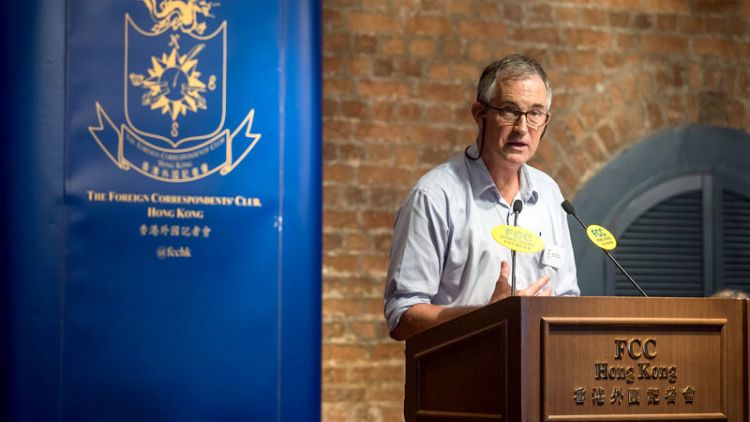By James Pomfret
HONG KONG (Reuters) - Several Hong Kong media and legal groups urged the government on Monday to explain why it refused to renew a work visa for a western journalist who hosted a speech by an independence activist, raising questions about promised media freedoms.
Chinese-ruled Hong Kong last week rejected an application to renew the work visa of Financial Times Asia news editor Victor Mallet, who also serves as the vice-president of the city's Foreign Correspondents' Club (FCC).
It came two months after government officials in China and Hong Kong condemned the FCC, one of Asia's leading press clubs, for hosting a speech by an independence activist, Andy Chan, reigniting debate about the viability of the city's promised freedoms. Mallet chaired the event.
Hong Kong, a former British colony, returned to Chinese rule in 1997 under a "one country, two systems" principle, with the guarantee of a high degree of autonomy and freedoms, including freedom of the press, not enjoyed elsewhere in China.
The journalist groups presented a petition with more than 7,000 signatures, calling on authorities to explain exactly why Mallet's visa wasn't renewed and to "rescind their decision".
The visa refusal, which the Hong Kong Journalists Association said was unprecedented, drew criticism from the United States.
The Hong Kong Immigration Department gave no immediate response to a request for comment.
Mallet, who was travelling away from Hong Kong when his work visa renewal was refused, was allowed back into the city on Sunday. But he was only granted a seven-day tourist visa, rather than a six-month visa that is usual for British nationals.
"Immigration officials did not provide an explanation for the shortened visitor visa, and we continue to seek clarification from the Hong Kong authorities about the rejection of his work visa renewal," the FT said in a statement on Monday.
A statement issued by a group of prominent Hong Kong lawyers, including Bar Association Chairman Philip Dykes, expressed concern about the move.
"We would not speculate on the reason behind such rejection, but we do wish to point out that such rejection calls for an explanation in light of its unprecedented nature and its profound impact on Hong Kong’s press freedom," the statement from the lawyers read.
China's state media said Hong Kong's "one country, two systems" formula remained unchanged.
The China Daily newspaper said visa renewal was a sovereign right and that accusations from some foreign authorities were an attempt to attack the Chinese government.
"Foreign governments demanding an explanation know this. What they really want is not an answer but to create the illusion that freedom of speech and the press in Hong Kong is dwindling," the China Daily editorial said.
"There is also the allegation that the central government is trying to 'mainlandize' the SAR ... However, the accusers' real intention is to smear the way 'one country, two systems' is being practised," it said, referring to Hong Kong's official description as a special administrative region (SAR) of China.
The Global Times newspaper, published by the ruling Communist Party's official People's Daily, said the visa denial had nothing to do with freedom of speech. However, it said Mallet's actions at the FCC "damaged China's national security and undermined freedom of expression".
"All countries and regions have things which they feel sensitive about and are unable to back down," it said.
"Hong Kong will get better without Mallet. The city's future doesn't need to be the concern of Mallet, the UK government or Western media," the Global Times said.
A columnist for the pro-Beijing Ta Kung Pao newspaper wrote on Monday that the fact that Mallet had merely been asked to leave Hong Kong, rather than executed by a firing squad, showed how "civilised" the authorities were.
(Reporting by James Pomfret and Anne Marie Roantree in Hong Kong and Brenda Goh in Shanghai; Editing by Paul Tait and Nick Macfie)
